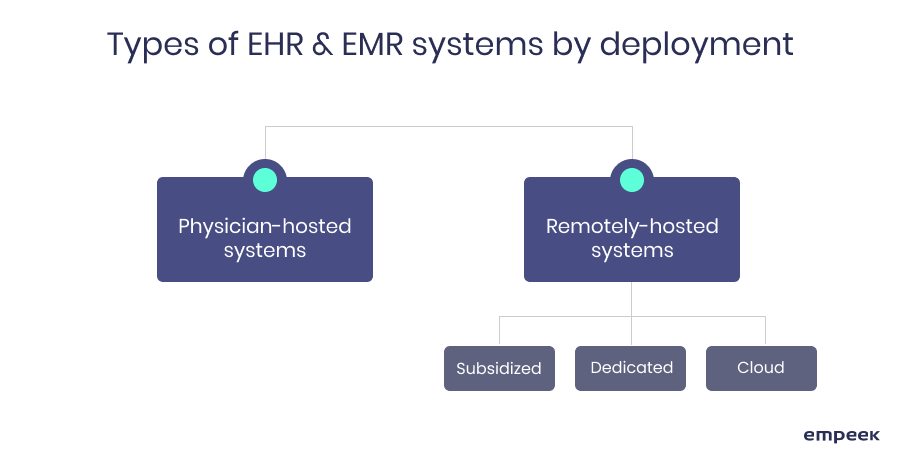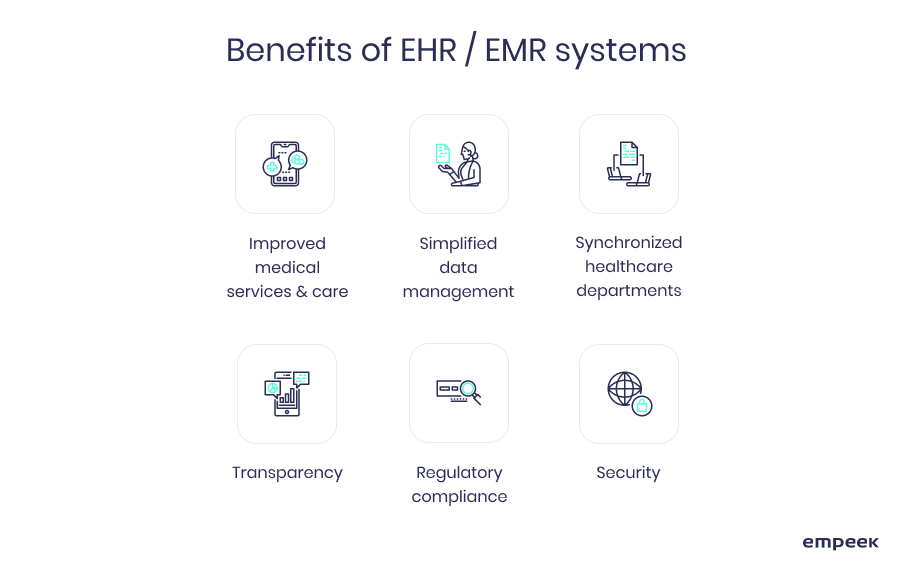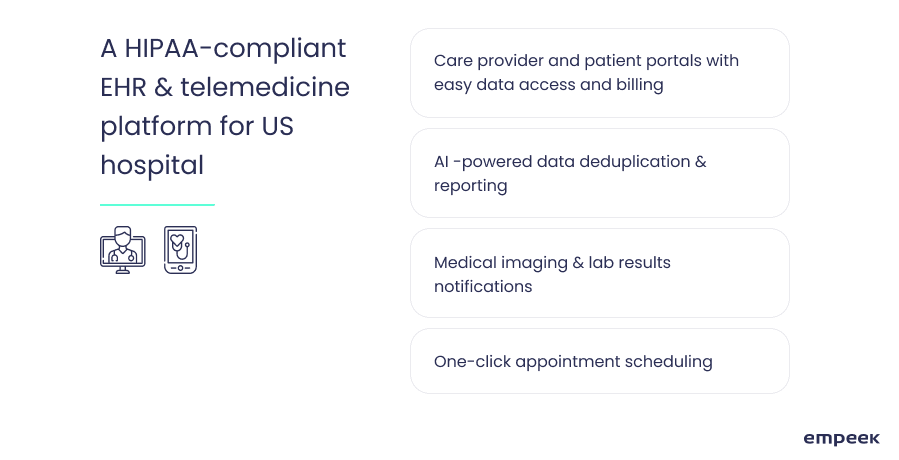So you have decided you need an EHR or EMR system, right? Well, that’s a great thing to do. But how are you going to choose the best option among multiple software types?
Different types of electronic health record systems have different functionality and technical characteristics. Some of them are hosted on physicians’ servers. Others require cloud storage and are offered as SaaS solutions. The options are versatile and heavily affect the operation and the cost of ehr implementation in hospital.
To ease the pain of the choice for you, Empeek has prepared an overview of different EHR software and EMR systems. In this article, you will learn how EHR and EMR services differ and what are their main types.
After reading it, you will better understand which healthcare solution is right for you.
What are EHR / EMR Systems? Is There Any Difference?
Different electronic health record systems and EMR systems are used by hospitals to store health information and patient records, schedule patient appointments, remind doctors about lab results or any scheduled activities, and communicate with patients online. EHR and EMR systems also allow for simplifying a range of administrative tasks including billing, reporting, insurance reimbursement, and many others.
Although the terms EHR and EMR systems are often used interchangeably, these solutions have some differences. Let’s clarify the discrepancies before detailing the types of electronic medical records systems and EHRs.
Comparing EMR and EHR Solutions

Simply put, EMR systems for hospitals and other medical services providers are used for internal record-keeping within a healthcare organization. While serving as substitutes to paper patient records, they still have some limitations. For instance, patient data can be accessed only by a specific healthcare provider. Therefore, if a patient goes to another doctor, their medical records remain at the previous place and they cannot access this data.
On the other hand, different electronic health record systems offer more flexibility. It’s an advanced version of the EMR software that allows doctors and patients to share information. An EHR service is a multi-functional system that gives patients additional control over the treatment process. Regardless of where a patient goes, the medical team will be able to use the same medical data.
The Reasons For Investing in EHR/EMR Systems

The decision whether to develop an EHR or EMR mainly depends on the end-users and their needs. For those who want basic functionality for recording patients, selecting an EMR system is a good choice. In the meanwhile, in case you need to build a more advanced system with real-time data updates and physician-patient interactions, invest in different types of EHR software. You can learn about how to prepare for the implementation of the EHR system in our article.
After all, the options of electronic records management are versatile. You can create a custom system that can be scaled and modified as your healthcare organization grows. EMR and EHR solutions also vary by deployment and application. These characteristics will additionally affect what type of the tool you build and its capabilities.
Different Types of EHR Systems and EMR Software by Deployment
When it comes to EHR & EMR software deployment, there are several options that should be considered. To deploy an EHR/EMR system, you have to decide where to store your digital data. Overall, there are physician-hosted and remotely-hosted systems. Let’s further discuss different types of EMR and EHR systems below.

Physician-hosted systems
This type of electronic health records systems implies that EHR data is stored on the organization’s servers. By opting for physician-hosted systems, healthcare institutions have to purchase software and hardware, including servers. On top of that, there should be a dedicated employee for maintaining the system security and troubleshooting.
Physician-hosted types of EHR systems are the best option for larger practices since they are able to cover the overhead costs of such software and purchase the necessary equipment. Large healthcare facilities can also benefit from on-site servers and the increased data security they bring. It’s easier to control access to the storage and ensure the highest level of data protection. Besides, physician-hosted systems have better performance since they are located on-site. It can make a difference for organizations without dedicated internet connection.
Remotely-hosted systems
As the name suggests, remotely-hosted EMR systems in healthcare are based on remote data storage. Patient information is transferred to the servers of another entity. The third-party is responsible for system maintenance, security, and data backup.
This type of EMR/EHR solutions is preferred by small medical offices or providers that want to delegate data storage hassle. Such software allows doctors to focus on helping patients instead of finding solutions to IT challenges, which makes it increasingly popular today
Overall, remote systems for hospitals fall under three broad categories:
- Subsidized. In this case, a facility (e.g., hospital) subsidizes the cost of the EHR for a physician. The servers of the subsidizing facility are utilized and the physician has no control over the data. Although this model may be suitable for small practices with a limited budget, it entails antitrust and data ownership concerns.
- Dedicated. A physician stores EHR data on a vendor’s servers in a specified location. Even though the person doesn’t control data storage, they know where the data is kept.
- Cloud (or internet-based computing). Physicians entrust data to a vendor that stores it in the cloud. They can freely access the necessary medical information online. Currently, it’s the most popular and widely used model of data storage in different types of EMR systems. Besides, cloud-based EHR/EMR software is cheaper than its alternatives.
If you are still not sure which EHR/EMR deployment approach is for you, the table below displaying key differences might come in handy.
Differences in EHR/EMR Systems Deployment Options

Types of Electronic Health Records Systems and EMRs by Application
The deployment type affects the tech stack of your EHR/EMR system.However, to understand what specific features you need, you have to consider the application of the software. Therefore, when choosing the type of medical records management to adopt, it is important first and foremost to identify the core tasks that the system is required to perform. This will guide you on what software solution suits your business goals best.

The types of EHR systems and EMRs by application are the following:
- Clinical. These types of electronic medical records systems for hospitals are intended to help physicians manage patients’ treatment. They accumulate detailed medical information of all patients and provide medical staff with reliable and updated data.
- Administrative. Such an EHR/EMR solution enables healthcare providers to manage the relationships between a doctor and patient and automates the documentation and EHR data migration. This software is designed to control checkups, tests, meetings, and arrange other administrative aspects of healthcare services.
- Healthcare reporting. Reporting systems collect clinical data, statistics on patient behavior, pharmaceutical and R&D metrics, operational costs, and other data that allows healthcare services to measure the effectiveness of their work.
- Financing. EHR/EMR systems aggregate healthcare data that can be used for billing. These electronic data management solutions enable healthcare services to manage billing cycles, organize invoicing, and handle insurance reimbursements.
- Clinical research. Since medical research requires large volumes of patient information, EHR/EMR systems are often used to collect big data. This way they help to conduct clinical trials and evaluate the effectiveness of various treatment approaches.
A healthcare record management system can combine several of these applications or be more specialized. Therefore, a business owner or startup investing in such software should know what they need from the start.
For example, if you offer an EHR solution for large healthcare organizations, complex multi-functional systems are preferred. They may include automated scheduling, billing, insurance, and other capabilities. Yet if you target small facilities, you should focus on clinical and administrative applications. They will be cost-effective and have a shallow learning curve.
5 Benefits of EHR / EMR Systems in Healthcare
Regardless of the types of EMR software you pick, these healthcare solutions have some universal advantages. They make healthcare organizations closer to digital transformation. Improved patient treatment and higher productivity are just a few of the core advantages to note. Discover more reasons to integrate EHR/EMR systems below.

1. Improved Quality of Patient Care
EHR/EMR solutions collect all critical information about patients. Thanks to this, physicians can personalize treatment and make data-driven decisions. 63% of primary-care physicians agree that EHRs have improved patient care in their practice. Healthcare services become more tailored and the risk of medical error declines. Besides, electronic medical data is often used to run clinical research and evaluate what treatment approaches yield the best results. This way EHR/EMRs also contribute to the quality of healthcare services.
2. Simplified Data Management for Physicians
Based on Stanford’s research, 66% of primary-care physicians state they are at least somewhat satisfied with their current EHR solutions. 63% believe such software improved their work. Digital storage (44%), care coordination (16%), and optimized billing cycle (13%) are listed as the primary value of different EHR systems by most PCPs. This proves that EHR/EMR solutions сan greatly help physicians to manage the clinical information of patients and keep it ordered.
3. Connected and Synchronized Healthcare Departments
The adoption of EHR/EMR software enables a healthcare organization to align the efforts of its multiple teams such as administration, informational, therapeutic, diagnostic, support services, and many others. . Thanks to EHR or EMR solutions, employees can exchange information instantly and coordinate their actions more effectively.
4. Regulatory Compliance
HIPAA and other healthcare regulations are not a piece of cake to follow. They limit data collection and retention practices, indicate how to transmit PHI, and require regular audits. Therefore, when a healthcare organization has an EHR/EMR system that automates these processes and is designed with compliance in mind, everything becomes much easier. It’s enough to implement the right software to meet the core regulations. Besides, EHR and EMR software solutions also ensure higher data security than legacy paper-based record keeping.
5. Market Advantage
In addition to the listed advantages, different EHR systems in hospitals are essential to compete in the current healthcare market. EHR/EMR adoption rates exceed 87%. In other words, by refusing to use electronic records, a healthcare facility becomes one of the 13% of laggards with poor quality of services. It will have troubles engaging and keeping patients because of this.
Cost of EMR and EHR System Development
Everyone considering different types of EMR and EHR systems wants to know the final price in advance. The cost varies depending on whether you only implement an EMR system provided by a third party or develop a custom solution. Custom EMR and EHR system development is quite expensive.
Overall, to get a basic working version for web, iOS, or Android, you will need at least a $60,000-100,000 operating budget. The cost of a cross-platform solution with rich functionality starts at $300,000. It includes electronic document management, medical dashboards, e-prescribing, time management and scheduling, electronic communications, and integration. Also, mind that since different EHR systems are more powerful than EMRs, they require additional investment.
If you want more accurate estimates, leave us a quote to discuss your project.
Our Experience With Key Types of EHR Software and EMR Solutions
Empeek is a team of experts who have cooperated with dozens of healthcare startups and businesses to help them with EHR/EMR software development. We can design both physician-hosted and remote systems depending on the preferences of our customers.
Empeek offers custom software development for large organizations and SMEs. Such solutions are tailored to the requirements of the specific vendor and include only the necessary features. They are scalable, secure, and stable, let alone being feature-rich and more UX-friendly than out-of-the box systems. Since 2015, Empeek has launched dozens of custom products for healthcare, including EHR/EMR systems, digital health solutions, mental wellness apps, and others.
One of Empeek’s successful projects is creating a cloud-based EHR and telehealth solution united in a single platform. This HIPAA-compliant solution replaced the legacy software of a US hospital helping it to engage more patients and improve care.
EHR Software Development Use Case

Check out the portfolio of other successful projects completed by Empeek.
Final Thoughts
To determine which types of EHR or EMR software your company should invest in, a great number of factors should be considered. It’s essential to evaluate the technical characteristics and application of various solutions since this decision will have a direct impact on the system’s cost and efficiency.
Fortunately, the variety of EHR/EMR systems allows any healthcare facility to find a perfect fit for its business needs and size. Whereas locally-hosted types of electronic health record systems are recommended for large healthcare organizations, remote storage is a natural choice for small facilities.
If you decide that currently available solutions cannot meet your needs, it’s better to create custom software based on EHR certification requirements. The Empeek EMR development company will be happy to assist you with the development, design, and maintenance. We can assemble a dedicated team of developers for your project to ensure maximum flexibility and agility.








